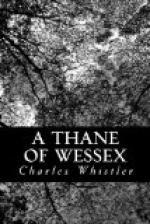So, because of these things known, Ealhstan spoke to me as a most loving father, praising me where it seemed that praise was due, and reproving me for the many things of deed and thought that were evil. And I told him freely and fully all that had passed from the time I left the hill of Brent till when I had seen the signals of the vikings from above Watchet, and bore the war arrow to Matelgar. The rest he knew in a way; but I opened all my heart to him, he drawing all from me most gently, till at last I came to my dream of Matelgar, and my wish that for me he might rest in peace.
“It is not all forgiveness, Heregar, my son,” he said presently. “There is love for Alsywthe, and pride in yourself, and thought of Matelgar’s failure, which have at least brought you to a beginning of it. But true forgiveness comes slowly, and many a long day shall it be before that has truly come.”
And I knew that maybe he was right, and asked his help; whereupon that was freely given, and in such sort that all my life long I must mind the words he said, and love him in the memory.
When all that was said he would have me hear mass with him, as though I needed urging. And there, too, were Wulfhere and Wislac; and that mass in the great abbey was the most wonderful I ever heard.
After that we three went out into the town, and Wislac and I marvelled at everything. Then we went to the nunnery gates and asked how our charges fared, and then saw to our steeds. There was the collier, working as a groom with the other men, and he told me that he was learning his new trade fast, but would fain walk ever, rather than ride, having fallen many times from the abbess’ mule, which he had bestridden in anxiety to learn. Whether the mule was the better for this lesson I doubt.
When we went back to the abbey Eanulf had come, and with him many thanes. And I feared to meet these somewhat, for they might have been among the Moot, and would know me. Yet Ealhstan had foreseen this, and one was posted at the door to meet me, bidding me aside privately, since the bishop needed me.
Wulfhere and Wislac went into the hall and left me, therefore, and I was taken to a chamber where were six or seven lay brethren, who asked me many things about the fight, and specially at last about the saint who had appeared. And that was likely to be a troublesome question for me, as I could not claim to have been the one so mistaken; but another struck in, saying that there were many strange portents about, for that a fiend had appeared bodily from the marsh and had devoured a child, in Sedgemoor. Now it seems that fiends are rarer than saints among these holy men, and they forgot the first wonder and ran on about the second, not thinking that I could have told them of that also. And at last one fetched a great book, as I thought in some secrecy, and made thereout nothing more nor less than parts of the song of Beowulf itself, and all about Grendel, which pleased us all well, and so we were quiet enough, listening.




